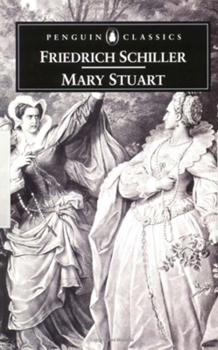Mary Stuart
Select Format
Select Condition 
Book Overview
Schiller was profoundly shaken by the failure of the French Revolution and devoted many of his greatest works to debating the true nature of freedom. Here, in scenes alternating between the palace of Westminster and the prison at Fotheringhay, he shows us a captive heroine rising above her suffering to gain in insight and spiritual depth. The deceitful and indecisive Elizabeth, trapped by the cruel demands of Realpolitik, can achieve worldly victory...
Format:Paperback
Language:English
ISBN:0140447113
ISBN13:9780140447118
Release Date:January 1999
Publisher:Penguin Publishing Group
Length:176 Pages
Weight:1.80 lbs.
Dimensions:0.4" x 5.1" x 7.8"
Related Subjects
Drama History Literary Literary Criticism & Collections Literature Literature & FictionCustomer Reviews
4 ratings
What to do?
Published by Thriftbooks.com User , 14 years ago
Friedrich Schiller wrote this drama about the power struggle between Elizabeth of England and Mary of Scotland after he finished the Wallenstein trilogy, his Thirty Years War drama. He finished MS in 1800 and it had a triumphant stage premiere shortly afterwards, in Weimar. Schiller was by now `over' his Sturm und Drang period and had become a co-leader of classicism, teaming up with Goethe. He said of this play that he had had enough of war and heroes and soldiers, he was looking more for passionate humanity than for history. Consequently he wrote a credible drama about semi-fictional characters. As long as you don't confuse this with historiography, the method is fine with me. The drama focuses on Mary's last 3 days, beginning with her verdict in the first of five acts. Mary does not recognize the authority of the court. She sees herself as a state guest, the legitimate queen of another country who had come to England asking for shelter. She had fled Scotland after her own murderous activities had made her unsafe there. In England she had been put in jail, now since 19 years. Her imprisonment is motivated by the fact that she would have been able to claim a possibly better right to England's throne than the current job holder. In other words, Elizabeth has reasons to fear her, especially in view of her Catholic backing in France and Spain. Apart from that personal motive, Elizabeth has the pressure from her court that fears a return to a Catholic ruler. On the other hand there may be benefits in a milder rule. Mary's state of mind in captivity is ambivalent: she resents the treatment that she is given, hopes to be able to talk to Elizabeth and reach an understanding, but at the same time she is haunted by her own conscience about her past murder of her husband at home. The trial against her is however about something else. She is accused of having tried to conspire with England's enemies to usurp the throne. Mary feels innocent in that respect and even her captors are aware that the trial itself was not following proper procedure. Schiller weaves a conspiracy of an attempted jail break involving some double-dealing noblemen. But the true high point of the play is a personal confrontation between the two lionesses. Pride, jealousy, fear, humiliation come into play. Mary wins the battle and loses the war. Elizabeth had been of a split mind, but Mary's aggressive and offensive behavior towards her leaves her no choice. Still she tries to escape direct personal responsibility for ordering an execution - in vain. The plot in Schiller's version probably has as many holes as a sieve, historically, but as a human confrontation it works very well. The language has matured since the puerile enthusiasm of some earlier plays. There is also, luckily, no morality tale, no attempt to manipulate the audience to whatever good cause. The play has been staged recently in London, to much acclaim, and traveled to the Broadway from there. Which goes to show t
Beware!
Published by Thriftbooks.com User , 17 years ago
The translation of Mary Stuart that you see when you "Look Inside" is not the same one that is being sold on this page!!!!
A Masterpiece
Published by Thriftbooks.com User , 19 years ago
A brilliant psychological drama. Schiller begins with presenting Mary as the epitome of passion and misguided sincerity, with Elizabeth as the epitome of rational calculation and statecraft. With superb plotting, he stages their confrontation to emphasize their common features and with elements of role reversal. The confrontation essentially purifies their original characters, heightening the contrast between passion and calculation. I don't read German but this translation contains a great deal of eloquent language and an appropriately Shakerspearean flavor.
The "Mary, Queen Of Scots" Play Used In "Anne Of Avonlea"
Published by Thriftbooks.com User , 25 years ago
This is the play that was used in the 1987 (?) movie, "Anne of Avonlea." It's really neat!





